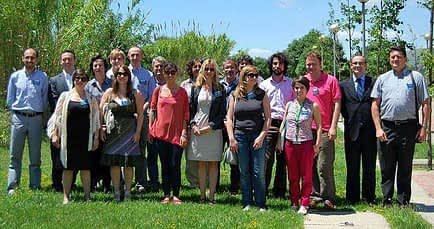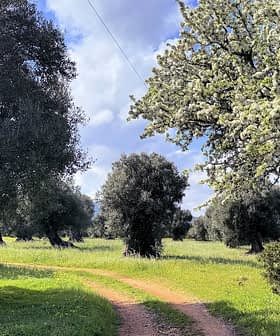
The Oli-PHA project was launched in IRIS facilities, at Castelldefels, Barcelona, on June 11th and 12th, 2012
The launch of a new research project investigating the production of bio-plastics from olive mill waste waters promises an environmentally friendly use for the 30 billion litres of waste water generated around the world each year.
The Oli-Pha project is the result of a amalgamation of industries, research facilities and universities from major olive oil producing regions in Europe and Latin America.
Representatives from the olive processing, plastics, packaging, food engineering , and environmental sectors have joined to realize the venture, which was launched in the Parc Mediterrani de la Tecnologia de Castelldefels in Barcelona in mid June this year.
It is hoped that the project will address the challenges faced by olive oil producers in hazardous waste water disposal, while providing an extra source of income through the generation of bio-plastics.
The project is based on a holistic environmental approach termed “MaxiUse”, which aims to increase the sustainability of materials and processes.
The concept involves olive mill waste water being used as a culture medium for the generation of the substance polyhydroxyalkanoate (PHA), a type of bio-plastic. PHA is produced by photosynthetic bacteria, known as cyanobacteria, which is traditionally cultured on refined feedstocks such as glucose in the production of PHA.
The use of olive mill waste water as a culture medium however, presents a more sustainable solution which reduces environmental impact and avoids competition with food sources. The process can also be optimized through genetic engineering of cyanobacteria and creating bio reactors that supply the ideal environment for the process.
Not only will the generation of this material go some way in relieving the difficulties in waste water disposal faced by olive processors, but it is also expected to have a beneficial outcome for the plastic and packaging sectors, providing a cost effective, biodegradable, renewable product that can be used for food packaging.
This greener alternative to plastics made from fossil-based polymers is hoped to be a viable option for ensuring a long term supply of plastic products and one that meets the growing consumer demand for more sustainable and environmentally friendly plastic alternatives that offer the same quality as fossil-based versions such as rigidity and flexibility.
Research into the effects of other compounds found in the waste water, such as polyphenols, which are potent antioxidants, will also be carried out. These bacteria resistant substances, which have previously created problems in waste disposal as they cannot be broken down by bacteria used in normal waste treatment, may in fact be beneficial when incorporated into bio-packaging, leading to features such as extended shelf life of packaged goods in food and potentially other industries such as cosmetics.
The Oli-Pha project is a three year venture funded by EC’c Seventh Framework Programme.








